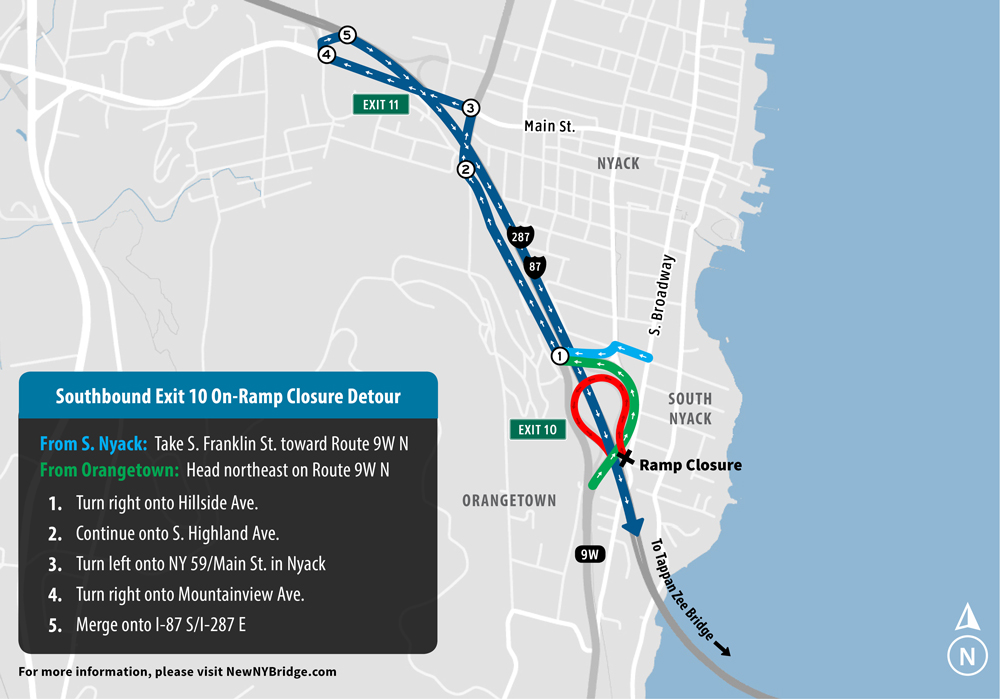Work on the New NY Bridge project’s temporary cashless tolling system in Rockland will continue during the coming week near the southbound New York State Thruway (I-87/I-287) exit 10 (Nyack – South Nyack – US Route 9W) on-ramp.
Work associated with the system, also called all-electronic toll collection, will necessitate closing the on-ramp during the overnights of Tuesday, March 15, Wednesday, March 16 and Thursday, March 17. Specific ramp closure times are detailed in the chart below.
The cashless tolling system is expected to be activated this spring.
RAMP CLOSURES NEAR THE TAPPAN ZEE BRIDGE
| DATE: | CLOSURES BEGIN: | CLOSURES END: | LOCATION: |
| Tue., 3/15 | 9 p.m. – On-ramp closure | 5 a.m., Wed., 3/16 | Southbound Thruway exit 10 |
| Wed., 3/16 | 9 p.m. – On-ramp closure | 5 a.m., Thu., 3/17 | Southbound exit 10 |
| Thu., 3/17 | 9 p.m. – On-ramp closure | 5 a.m., Fri., 3/18 | Southbound exit 10 |
Demolition of Former Maintenance Facility
TZC will continue excavating the foundations of the New York State Thruway Authority’s former maintenance offices in Tarrytown this week.
Bridge maintenance teams currently operate from a temporary facility near exit 12 in West Nyack. The demolition will make way for a new maintenance facility, which will begin construction this spring.
Noise Barrier Construction
TZC will continue constructing noise barriers along the Thruway in South Nyack next week. The work includes constructing noise barrier foundations and excavating soil along the southbound Thruway between the South Broadway bridge and River Road. After the foundations are established, concrete panels that form the noise barriers will be installed. The barriers will be treated with sound-absorbing material to further reduce traffic noise to the nearby community.
TZC will also continue constructing foundation walls for the future highway and shared-use path along the northbound Thruway in South Nyack. The operation is scheduled to continue in the coming months.
Additional work includes:
- Main span tower construction
- Support for river-based work from the Rockland trestle
- Rockland landing retaining walls
- Survey inspections on the existing bridge
- Westchester landings utility work
- Girder assembly placement
- Bridge road deck installation
- Drainage structure installations
Boater Safety
Marine units are continuing patrols to monitor the construction zone and encourage all boaters to obey the established U.S. Coast Guard safety protocols.
The U.S. Coast Guard has established a Safety Zone surrounding 16 construction barge mooring locations at the project site. No unauthorized vessels are allowed in the Safety Zone. In addition, marine law enforcement will be enforcing the rules of the expanded Regulated Navigation Areas (RNAs) east and west of the Safety Zone. The RNAs stretch 500 yards north and 500 yards south of the existing bridge. Boaters are urged to transit the main channel with no wake at a maximum speed of 5 knots and to use extreme caution on the river at all times.
More New NY Bridge boater safety information, including the U.S. Coast Guard Notice to Mariners, construction site maps, can be found here at NewNYBridge.com. The page includes an interactive GPS map showing vessel locations on the Hudson River, detailing which vessels are stopped and which are in motion to a new location for recreational and commercial boaters to get current information on the very active construction zone. The vessel tracking map is for informational purposes and not intended for navigation.
Mariners also should be aware that TZC will continue work in the vicinity of the side channels under the existing bridge. Additional temporary navigational lights have been installed to further define the 600-foot navigation channel under the main span. Permanent elements of the new bridge are lit per U.S. Coast Guard requirements, as are all moorings, barges and other equipment.
All lane closures are subject to change due to traffic, weather or emergency situations. Please visit https://www.thruway.ny.gov/travelers/map/ for real-time information regarding traffic conditions.

